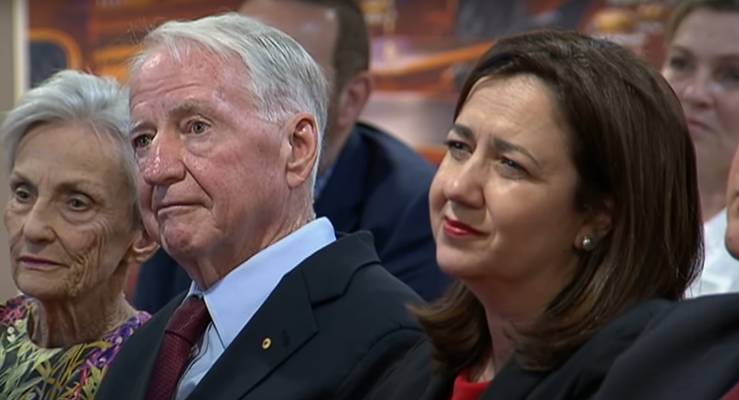
Tony Fitzgerald is as synonymous as Expo 88 with the modernisation of Queensland. Thirty years after his corruption-busting report which closed the door on the Bjelke-Petersen era, he’s about to raise the shutters on the performance of the body that has been at the centre of the reforms he initiated.
Today Fitzgerald and retired Supreme Court justice Alan Wilson will hand over to the Palaszczuk government their report on the performance of the Crime and Corruption Commission (CCC). Assuming precedent and a modicum of decency prevails, it will be released soon after.
What Fitzgerald says still has an impact in Queensland. His initial report was greeted by National Party premier Mike Ahern in 1989 with a promise to implement it “lock, stock and barrel”, a turn of phrase Annastacia Palaszczuk borrowed when she accepted, unread, a report deeply critical of her government’s culture and integrity just a month ago.
Right now, as her government reaches the midway mark of what looks like its final term, Queensland is awash with inquiries, mainly concerned with addressing shortcomings in integrity or performance. It’s not alone, and the remit of corruption-busting bodies such as the ICAC in NSW and the proposed federal body and how their powers are used will be on display in Fitzgerald’s latest exposé.
Fitzgerald’s inquiry is focused on the functions of the CCC, particularly in light of one of its investigations which led to the sacking of Logan City Council but with no successful prosecutions. What the public has been seeing of the CCC is this pattern of performance: lengthy investigations, serious allegations but no charges sticking.
The CCC’s critics see it as a corruption-buster seeking outcomes to match its mission. Just ask Jackie Trad, the former deputy premier and treasurer who quit ministerial office in the face of a third investigation into her conduct (after two had raised concerns but cited no wrongdoing).
Fitzgerald, even at 80, has infinite capacity for surprise and it would be no surprise if he found the shortcomings of the commission were due more to its legislative constraints than its prosecutorial shortcomings.
But what will make Fitzgerald interesting south of the Queensland border is what one of the original architects of the standing royal commission arbiter of corruption and integrity thinks of the current environment. This must inform the shape of the integrity commission Anthony Albanese has promised to create in this term of Parliament.
At the heart of Fitzgerald’s inquiry is the question of whether a law enforcement body is right to sully or destroy reputation on issues that sometimes don’t even justify a charge, let alone a prosecution.
The Queensland CCC has not been as adventurous as NSW’s ICAC in this regard, principally because it is limited in its use of public hearings as a tool for investigation and, yes, embarrassment. The federal model proposed, but never acted on by the former Morrison government, had even tighter constraints. What Fitzgerald says about the use or need of these powers must influence the model federal Labor creates.
It’s disconcerting that those elected to be responsible for legislation and regulation on our behalf need to have statutory oversight over their integrity, but we see case after case justifying these powerful watchdogs.
Fitzgerald has conducted his inquiry quietly. Submissions have not been made public but he promises they will be. There have been no public hearings and little public agitation for what he should or should not find.
The tone was set by Professor Peter Coaldrake’s report which artfully stayed away from the intricacies of the CCC’s operations — aside from noting its dominance of a Queensland integrity system it found to be frayed.
And in the background has been two Supreme Court cases, one involving Trad and the other former public trustee Peter Carne — each trying to stop publication through parliamentary privilege of CCC reports which detail allegations which concern the CCC but do not justify prosecution.
On Friday, the Queensland Court of Appeal upheld the Carne appeal, setting a precedent which takes away part of the bully pulpit the CCC relies on for its role of educating the public on corruption or misconduct.
Fitzgerald 2.0 holds a lot of promise to set the CCC in a new direction but also to guide the architects of the long-awaited and much-needed national integrity body.








“…. midway mark of what looks like its final term, …”?
What was King’s old alma mater’s knee-jerk reaction to Fitzgerald’s (along with the rest of the judiciary’s) critical reflections on Newman-Bleijie’s Limited News Party government’s “Bikie laws” (with Carmody singing their praises) and subsequent elevation (to out of his depth) Tim Carmody to Qld’s Chief Justice?
Printed scorn and dismissal.
This time it’s different. This time it’s “Labor” in the spotlight…..
I do hope that the report causes the current government to pay attention but “midway through it’s final term…”. Have you had a look at the opposition?
A flash David Janetzki and I see Martin Tenni all over again.
Sad indictment of media in Oz and elsewhere where they seem to be implicitly, but unwitting supporters of the right wing nativist libertarian (now) status quo they run protection for. This is manifested in constantly focusing on anything else to deflect from the same ‘powers that be’ and indulging their imported media tactics; doesn’t say much of how empowered or smart these people are ‘following orders’?
Well, the report has been handed down now. And Transparency International’s Professor AJ Brown says:
“Brown was critical of the parliamentary inquiry into the CCC’s Logan investigation. “The allegation that the CCC was out of control was always overblown,” Brown said. Brown said Fitzgerald’s “very sound and thorough” report was vindication that the “wildly out of control CCC” narrative was always false.
https://www.theguardian.com/australia-news/2022/aug/10/tony-fitzgeralds-inquiry-into-queenslands-ccc-could-be-blueprint-for-federal-icac-expert-says
So maybe it isn’t quite true about Premier Palaszczuk, that there’s “trouble in paradise, where a string of integrity issues continues to plague her government and dominate the news agenda”?
https://uat.crikey.com.au/2022/04/29/wheres-palaszczuk/
Maybe that dominating “plague” is just a beat-up by an anti-Labor journalist or two?
I mean, we expect that from The Courier-Mail but we wouldn’t expect it from the non-Murdoch press would we.